Here are our core activities. (UNDER CONSTRUCTION)
Wide bandgap semiconductor characterisation

We investigate the properties of UV photodetectors. develop several novel approaches to characterise semiconducting samplesSome examples:
Emerging ultraviolet (UV) detection technologies
We investigate the properties of UV photodetectors. Some examples:

Low-cost production of UV sensing materials

We engineer low-cost methods to produce Ga2O3 materials and devices, to help the implementation of UV technologies for everyone.